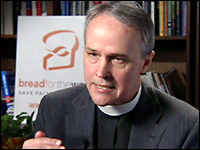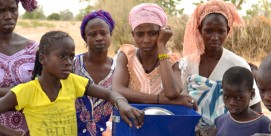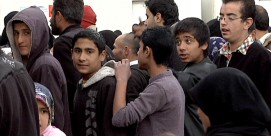In This Episode << SLIDE LEFT TO SEE ADDITIONAL SEGMENTS
Global Food Crisis
BOB ABERNETHY, anchor: The global food crisis is escalating, as high food prices are forcing humanitarian organizations to scale back operations. At the United Nations, leaders are appealing for more than $750 million in new aid. At the White House, President Bush called on Congress to provide funds to help alleviate the emergency. We spoke about the world food crisis with Reverend David Beckmann, president of the Christian anti-hunger lobbying group Bread for the World. He is a Lutheran pastor.

David Beckmann |
Reverend DAVID BECKMANN (President, Bread for the World): Routinely, 850 million people in the world are undernourished. But over the last twelve months the prices of the world’s basic staples — rice, corn, and wheat — have all shot up by about two-thirds, so about another 100 million people are being driven into hunger. It’s partly that incomes have been going up in Asia, and so there’s new demand for food in Asia. There were bad harvests in some important agricultural countries. Higher oil prices have also helped to drive up food prices. In our country, we’re using corn now increasingly to produce ethanol — that’s part of it. We ought to take a look at our ethanol policy and maybe slow it down or modify it some, because it is contributing to hunger around the world and that wasn’t — that clearly wasn’t our intention.
The effects of this hunger crisis are really grim. In Haiti, for example, many people are filling up their children with cookies made out of mud. There’re certain muds that have a bit of nutritional value in Haiti, and so they take that mud with oil and sugar and make cookies and gag that down. There’s a lot of desperation. And then that’s showing up in political unrest, in food riots and other unrest in about 30 countries.
We need more food aid for hungry people. Food aid goes especially to camps. These are the most desperately poor people in the world, and the money that’s been appropriated for food aid is not going as far. So rations in Darfur, for example, have been cut in half. The other thing that needs to happen is a strengthening of global agriculture, especially agriculture in the poor countries. The hidden hope in this crisis is that it can be solved especially by agricultural development in poor countries. There are about 100 million people, really poor people, who are suffering hardship because of the high food prices. But there may be 600 million equally poor people who are struggling to make a living in agriculture in poor countries. So if we can invest in agricultural productivity among those poor people, they can help to bring down the food prices and at the same time improve their own livelihoods.
I think this hunger crisis really is a religious issue, because if we know anything about God we know that God listens to the prayers of hungry mothers who can’t feed their kids. When that mother sighs and asks for help, we know that God is there, and so responding to those mothers by the hundreds of millions is a profoundly religious act. It is sacred work.







